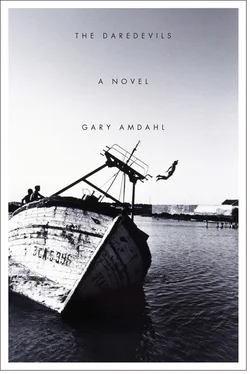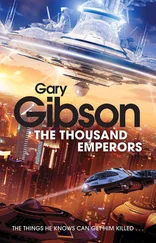“If they finish a job in one hour rather than ten, they get paid a dime rather than a dollar,” Amelia said.
“Don’t get hysterical, sister,” Tony suggested in his precociously vaudevillian way, having heard Andrew kid Amelia in this way more than once.
“If a dime,” Amelia said mock-tersely, “bought a dollar’s worth of groceries—”
At which point Mother, out of hard-earned habit that would likely never fade, gently spoke her daughter’s name.
“—then certainly they could take advantage of your fabulous discount, my dear little brother, but it doesn’t, it’s more like a nickel, so either they take longer to do the job and get paid a living wage or they hop to and starve to death.”
Father thanked Amelia with jovial conclusivity: yes, her brothers, both the younger and the older, were dolts but they would run the country.
Amelia smiled and said they ought to consider ten-man brushes that could be controlled by a lone halfwit and so expensive that no single painter could afford it, leaving the purchase as usual to Big Business.
In the old days, she would have then nodded at Father in a final attempt to be courteous — not to mention knowledgeable about the imperatives and requisites of actual large businesses — before dashing at the dining-room door, struggling as if drunk to open it, slamming painfully into the frame, and staggering into the hall. Mother would have offered the rest of the family a tastefully understated look of comic surprise, and they would have resumed their meal.
Now, however, the Reverend Ruggles, who had relaxed his grip on Tony’s head but not released him, put a head-lock on Gus, and the three of them began to laugh and struggle.
It had happened so often that it was referred to as a Ruggle-struggle.
The boys flailed and grunted and Thomas shifted his weight about.
When the boys gave up and went limp in his embrace, he said, “Your sister has learned to talk rough with her brothers, but don’t take lightly what she says. It will be very easy for you to say to her, and to all women, ‘And what in the world does a woman know about it?’ So I want to urge you to think very seriously about what women may know about things. All right?”
The boys cheerfully agreed that they would do so.
Charles said, “I’m asking whoever wishes to answer: ‘What is for you the greatest unhappiness?’”
Father was smiling vacantly, eyes angled to the side of his plate of bacon and eggs. He looked as if he had not heard a word anybody had said for some time. Mother was staring at Father. She turned to Charles, puzzled at first, then annoyed.
“What kind of question,” she asked, “is that?”
“In what place would you like to live? What is your ideal of earthly happiness? For what faults do you have the greatest indulgence? What is your principal fault?”
“In Anatarctica!” shouted Tony, “where I would never have to hear questions like those at breakfast.”
Charles half-smiled at him.
“I’m kidding you, Chick!”
“The ranch,” said Father. “It is my ideal of earthy happiness.”
“Simply existing there?” probed Charles, with faint but apparent testiness. “Standing in a meadow? Rocking on the porch? Soaping the saddles? Those are all fantasies that depend on a state of mind, a condition of soul. Continued indefinitely without change. Which is impossible.”
“You asked me what my ideal of earthly happiness was and I—”
“I too,” said Amelia, “would like to live at the ranch, breeding Appaloosas, but my ideal of earthly happiness is working in a hospital twelve or eighteen hours a day. I think particularly a hospital for the insane.”
“Yes,” said Pastor Tom, “you see, that has been my point all along, that living an ideal of earthly happiness is not only possible, it is preeminently so, supremely and excellently possible. It is simple to do and it is easy to do. The spirit is reticent. The ego is aggressive. Surrender is the antidote.”
“Surrender to what, the ego?” asked Charles, laughing lightly and mirthlessly.
“When you surrender, when you let your ego collapse, you achieve union with God. In that union, a life of humbly helping other people seems. ideal. Happiness follows, as our Oriental friends like to say, like the wheel of the cart follows the hoof of the ox. The line is from their Dhammapada and refers to suffering rather than happiness, but the implication is that if you want nothing and accept the world as it is, you will cease, at least, to suffer. One substitutes love for selfishness. It is revolutionary but can be accomplished in the wink of an eye. ‘Whoever uncouples the religious and the social life has not understood Jesus. Whoever sets any bounds for the reconstructive power of the religious life over the social relations and institutions of men, to that extent denies the faith of the Master.’”
“Thank you, Pastor Tom. For what faults do you have the greatest indulgence? What is your principal fault?”
“I have the greatest possible indulgence for all faults. My own principal fault? I think the best illustration is to be found in the proud ease with which I answered your question.”
Instead of politely acknowledging his brother-in-law’s wisdom and humility, he turned to his little brothers.
“I sure shut you two up, didn’t I.”
They had long since ceased to smile and were now silently gauging Charles and Mother.
“Yes, Charles,” said Mother, “you certainly did. Was that your goal? To cause your brothers to stop laughing and begin to worry about you? Or were you playing to Amelia, hoping she would say something careless about your own mental health that would confirm you delightfully in your new role of theater visionary. Your board wants you to produce a play by Henry James, a play by Shakespeare, and a play by August Strindberg. They would like to see you do it with a small ensenble and the plays in constantly rotating repertory. They would like you to bring to bear current ideas in design. They would like to see charming, interesting shows, and they would like to see the house at capacity every night, as they rightly are concerned about viability in the long term. I would never have even so much as spoken Sir Edwin’s name much less invited him here had I known how vulnerable you were to spiritual imbalance.”
“Mother’s answer stands like a druidess invisibly behind her actual speech, as per usual. ‘Spiritual imbalance’?”
“Sadness,” said Father, “is the fault for which I have the least indulgence. The Stoics forebade it and I — well, you know this already. You’ll have to pardon an old man who has used up all the brains he had and is limping along as best he can without any.”
Charles gave nobody the chance to laugh. Father was playing at seeming as weak and old as he actually was. As far as Charles was concerned, he was demonstrating how he could not be replaced: not swiftly, not easily, not at all.
“Father, what is your principal fault?”
“That I think I have none!” Father laughed loudly and longly, allowing everybody but Charles and Mother to join in. “No, no, my greatest fault is that I am old. I gave my life to San Francisco and have nothing left.”
“Excepting San Francisco herself, of course,” said Pastor Tom.
Father smiled but shook his head. He still looked like a gunfighter losing at cards.
“I put one Jew behind bars,” he said. “Other men rebuilt the city.”
“One Jew, perhaps,” said Mother. “But you must admit an important Jew.”
“Boss Ruef was not important. He was a sitting duck. He was a bagman.”
“Sitting duck,” said Gus.
“Bagman,” said Tony.
“For your father, boys,” said Father, “and your father’s friends.”
Читать дальше












